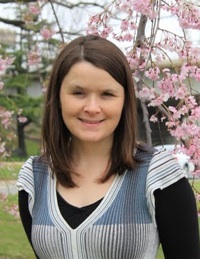
Susan Bultitude, Australia
Advisor to the Executive Director,
International Monetary Fund, Washington D.C.
Young Leaders Program (’06)
After completing degrees in Economics and Commerce at the Australian National University Susan joined the Australian Treasury in 2002. She started in the Budget Policy Division working on the Australian Government’s budget. In 2003 she moved to the Financial System Division where she was a member and manager of a team that monitored financial markets and designed and implemented policies to improve the functioning of the financial system.
In 2005, Susan came to GRIPS to pursue further studies under the Young Leaders Program from which she graduated with a Master of Public Policy in September 2006. After her return to the Australian Treasury she was soon hard at work to deal with the global financial crisis.
In June 2010 Susan started a posting to the International Monetary Fund in Washington D.C. as an advisor to the Executive Director representing 15 countries, including Australia. The issues she looks after range from commenting on economic assessments of individual fund members, to looking at global macroeconomic surveillance, to policy issues relating to the composition and governance of the Fund.
Please tell us about your career path so far. What is your area of specialization and how did you come to work in this area?
I am an economist with the Australian Treasury. I became interested in economics at high school when Australia experienced a severe recession. Small towns, like the one I grew up in, were more severely affected than the cities. I was struck by the high human cost of recessions – people lose more than jobs and and business opportunities, they also lose financial security, a sense of dignity and purpose, and confidence in themselves and their future. I became interested in how such situations could be prevented or addressed.
After completing degrees in Economics and Commerce at the Australian National University, and a cadetship at the Reserve Bank of Australia, I joined the Australian Treasury in 2002. As I had qualifications in both economics and accounting, I started in the Budget Policy Division, working on the Australian Government’s budget. In 2003 I moved to the Financial System Division, and worked on policies for the banking and insurance sectors. Within a year of graduating from GRIPS in October 2006, I was hard at work on Australia’s response to the global financial crisis. In 2010 I was chosen to represent the Australian Government in the Office of the Executive Director at the International Monetary Fund.
You are currently posted as an Advisor to the Executive Director at the International Monetary Fund in Washington D.C. What are your main tasks and responsibilities?
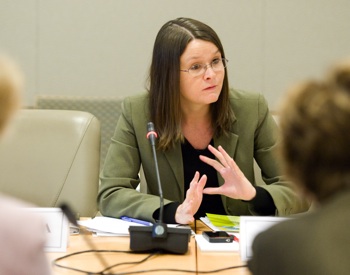
At an IMF pledging session for a Technical Assistance Trust Fund
The Executive Board is responsible for carrying out the day-to-day work of the Fund, on behalf of its 187 members. It conducts peer reviews of members’ economic and financial policies (known as ‘Article IV consultations’), approves and reviews lending programs to members with balance of payments pressures, and oversees the Fund’s policies and administration.
Our office represents 15 members of the Fund, including some larger countries such as Australia, South Korea and New Zealand, and some smaller countries in the Pacific region such as Vanuatu, Samoa, Kiribati and Tuvalu. I am personally responsible for representing Australia, Papua New Guinea and the Seychelles, which has a Fund program. I am also responsible for our constituency’s contribution to the peer reviews of countries from the Middle East and North African region, and parts of Asia. I work on a range of policy and administrative issues such as reforms to the Fund’s governance arrangements, the design of lending instruments, and the Fund’s administrative budget.
What are some of the biggest challenges you face in your work?
One very challenging – but rewarding – part of my job is working with people from all over the world to bring the Executive Board to a consensus. As any student at GRIPS will learn, different countries can have not only different approaches to addressing an issue but also different ways of negotiating and reaching a compromise.
Another challenging aspect is helping other members of the Executive Board and Fund staff to understand the special circumstances of our small island countries. Some of the countries in our constituency are small, very remote and particularly vulnerable to shocks. For example, Tuvalu is a country of only 11,000 people with a land mass of only 10 square miles. These countries face a unique set of challenges, and require a unique set of policy solutions.
What have been the most interesting or rewarding aspects of your career thus far?
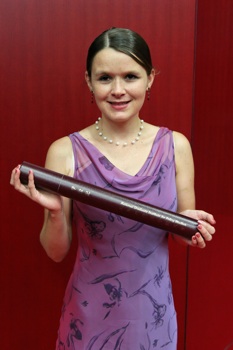
Susan, proudly showing her GRIPS degree
When I was working on the Australian Budget a key goal was delivering budget surpluses and eliminating the Government’s net debt. This meant that Australia was very well positioned to handle the global financial crisis – the Government was able to deliver a significant stimulus package that helped save jobs and support Australian households, while keeping debt at manageable levels.
One of the most memorable moments of my career was when the Government took the decision to provide a guarantee to deposits and wholesale borrowings of the banking sector. This was an unprecedented move in Australia – something I would never have dreamed could happen only a year or two earlier. Reflecting the soundness of Australia’s financial system, these guarantees have not been drawn upon.
More recently, I have found it very rewarding to expand my horizons, by contributing to good economic policy globally and in other countries.
What led you to GRIPS? What is the most important thing you got out of your studies here, and how has your experience at GRIPS prepared you for future endeavours?
After working full-time for 8 years, I was ready to do my Masters’ degree. I was also interested in travelling and learning more about other countries, given my experience to date had been focused on Australia. I had long been interested in Japan, so when the opportunity arose to apply to study at GRIPS I jumped at it!
Having the opportunity to study and socialize with students from all over the world was invaluable in preparing me for my current role. GRIPS gave me a better understanding of countries’ different approaches to economic policy, which has helped me to collaborate with my colleagues at the Board and appreciate the challenges faced by smaller, developing nations. In addition, some of the governance issues I deal with at the Fund reflect the shifting global dynamic – in particular, the rise in importance of emerging markets such as the BRICS relative to established powers such as the US and Europe. Our discussions in International Political Economy and Globilization on the decline of US hegemony provided the perfect background to this work.
The technical skills I gained during the course have also been very relevant. For example, in my Economic Modeling for Development Economics course I modeled the impact of booming demand for Australia’s mineral resources – not only has this helped me understand one of the most significant long-term trends affecting the Australian economy, but it has also given me some insights into the modeling techniques used by Fund staff. Similarly, my independent paper compared the bubbles experienced by Japan in the late 1980s and early 1990s with Australia’s housing boom of the early 2000s. This proved particularly relevant when, only two years later, asset markets in many advanced economies had gone from boom to bust.
What is your fondest memory of your time spent at GRIPS? And what do you miss about Japan?
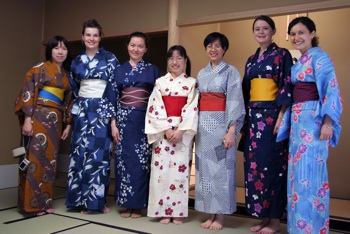
Trying on a yukata at one of the many GRIPS events
I have fond memories of the close friendships formed at GRIPS, especially among the Young Leaders Program. We saw each other every day in the classroom or while working on group assignments, but we also socialized together regularly. I have to agree with Angela (January’s Alumnus of the Month) that the Oscars ceremony was a highlight!
I miss the excitement and dynamism of Tokyo, and its many districts with distinct cultures and characters. I miss being able to hop on a shinkansen to visit a cultural treasure the other side of the country, and be back in time for classes the next day. I also miss the Japanese way of taking pleasure in day-to-day things, such as enjoying the passing of the seasons (which are particularly beautiful in Japan) and preparing exquisitely presented food. Even though I worked very hard at my studies, I feel my work-life balance was at its best during my year in Tokyo.
I also miss Japanese food! Here in Washington DC it is difficult to find good sushi and I’ve given up finding good ramen!
What do you like about living in Washington D.C?
Washington DC is similar to Canberra in many ways – both were designed specifically as Government towns and both are smaller, more sedate cousins to their countries’ financial centres. However, Washington DC is older, larger and more vibrant than Canberra. In many ways the things that I enjoy here are similar to those I enjoyed in Tokyo, such as the many cultural activities available – from museums, to monuments, to concerts – and interacting with a large, internationally-oriented policymaking community. I still feel a buzz every day, when I ride through the National Mall, passing the Lincoln memorial and seeing the Capitol in the distance. It is a little like the feeling of crossing Rainbow Bridge on the Yurikamome between GRIPS and TIEC, seeing landmarks such as Tokyo Tower among the skyscrapers, and perhaps getting a glimpse of Mount Fuji on the horizon!
Another similarity between Washington DC and Tokyo is that Washington DC has its own cherry blossom festival – thanks to the gift of 3,000 cherry trees from Tokyo’s Mayor Yukio Ozaki in 1912!
What is your favorite thing to do when you are not working?

Riding the bike around a civil war site in America
Living in Japan greatly strengthened my love of travel, and gave me lots of ideas of where I would like to visit in the future. In 2008 I visited two of my classmates in Thailand and Cambodia. In 2009 we went back to Japan, visiting Okinawa. I’ve also been to New Zealand, England and France (where I have family), and through my work I’ve visited Indonesia, Papua New Guinea, the Seychelles and, of course, America.
We try to get away regularly on weekends to explore the area near us – from hiking in beautiful national parks, to wandering the bustling streets of New York, to visiting American Civil War sites. We’re also fortunate to be close to many cultural sites, such as the Smithsonian museums and national monuments.
How do you maintain a balance between your work and the rest of your life?
With difficulty! At the peak of the global financial and economic crisis I was working long hours, and even when I wasn’t at work I was checking the news and my email frequently so I could keep on top of the latest developments. With my new job in Washington DC I have taken the opportunity to live a more balanced life. I enjoy having lunch or coffee with colleagues, which is a good way to break up the day while progressing work issues. I also try to keep my work in perspective – for example, by not devoting excessive amounts of time to things that are not important. Commuting to work by bicycle helps me to get some exercise every day, and as my ride home takes me past parks and over the Potomac River, I spend some time each day surrounded by nature. I also try to make enough time for my hobbies, such as learning French.
What advice would you give to current GRIPS students?
The classes are excellent, but there is so much more to your GRIPS experience than what happens inside the classroom! You will learn so much by socializing with your classmates and making Japanese friends. Also, for those of you who have already been working for a number of years, this is an opportunity to recharge your batteries and see things from a new perspective. Japan has a wonderful cultural heritage that I would encourage everyone to experience.
As for life after GRIPS, I would say never underestimate what a small group of dedicated policymakers, armed with the sorts of skills and experiences that you will have gained from your time at GRIPS, can achieve.
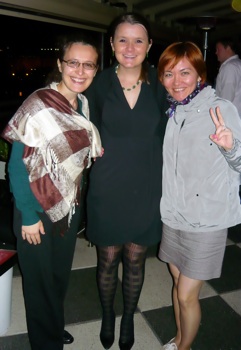
With GRIPS classmates when they came to Washington for the IMF/WB annual meetings.
To those students that will be in Tokyo in October 2012, I would encourage you to attend the Annual Meetings of the International Monetary Fund and World Bank Group, which will be hosted by the Japanese Government. There are often a number of seminars and press conferences that are open to the public, or you might even be able to register as a delegate through your home Government.
Do you have any suggestions on how to further utilize the GRIPS alumni network?
Last year I had the good fortune of meeting some of my GRIPS classmates (Angela and Salamat) in Washington DC, during the IMF/World Bank Spring meetings. I would invite other GRIPS alumni who are going to be in Washington DC to get in touch with me (via the alumni office) – I am always interested in making a new friend and reminiscing about Tokyo!
Similarly, if anyone is ever working on something to do with Australia, I would invite them to use the alumni network to connect with myself and other former GRIPS students from Australia.





